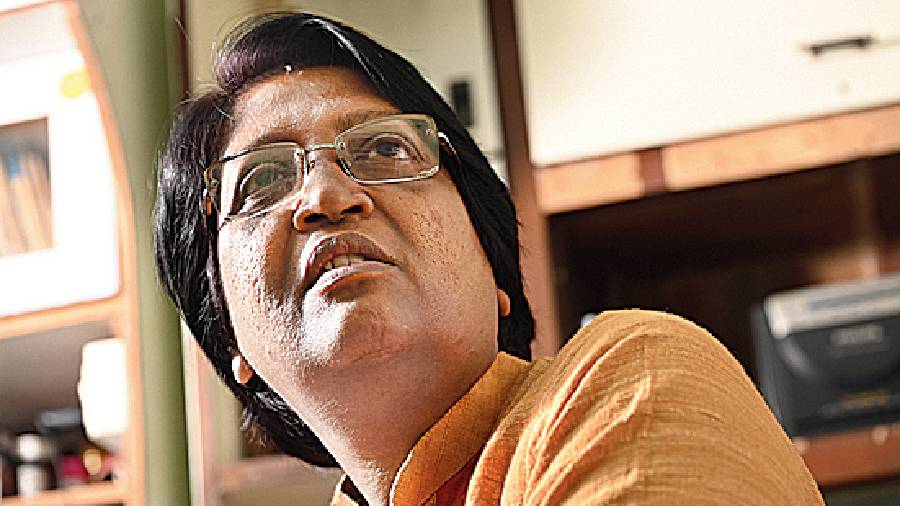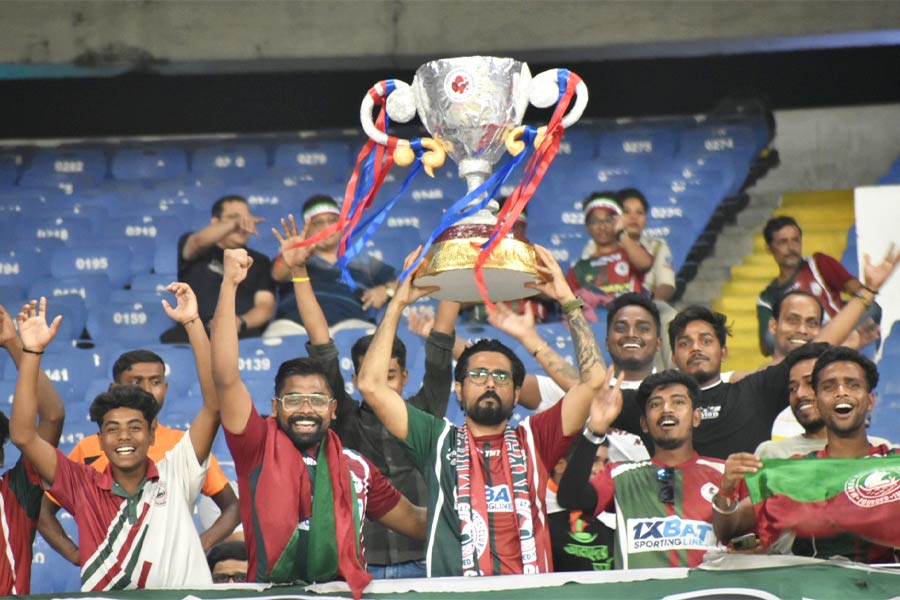When the case Soma Mukherjee had filed for maintenance from her husband was not making proper progress, she took a radical decision. She would argue her case herself.
It was hard. A battle of 15 long years would follow. It would require Mukherjee, 59, who had not had any experience of the courtroom before, to cross-examine her husband, something she now recalls with pride, as she does her decision to fight her case herself.
A diploma-holder in architecture from Women’s Polytechnic college in Jodhpur Park, she had got married in 1994. Since then she had lived with her husband in Garfa in Jadavpur, in a house that belonged to him. In a few years, a distance grew between her and her husband and in 2005, he said he wanted a divorce and to sell the house.
Sitting in the small drawing room of the same house, Mukherjee tells her story quietly, but in precise detail, step by step.
Ironically, her professional status would get in her way at times, as would her beliefs. At the polytechnic college she had been a student leader who took part in protests to improve college conditions, and later became an active member of a rights organisation. She participated in many movements for people’s rights and still does. “I met my husband in the movement,” says Mukherjee, who had started, with others, a women’s organisation called Nari Chetana in 2003.
But her work as an architect had stopped by then. “I had developed spondylitis and lumbar pain because of my posture as I did design work,” says Mukherjee. Her husband, who worked in the family business and, according to Mukherjee, earned a substantial amount, left her in 2005 to live with his family. Brokers began to come into the house regularly.
“I had nowhere to go. My only source of income was from the paying guests at the house. I decided to move court,” says Mukherjee. According to law, her husband could not sell the house without her consent. And she had the right to stay in the house. “In April 2006, I applied for a court injunction for a status quo on the house,” says Mukherjee.
When a lower court was not convinced that someone with her qualifications was entitled to such support, she went to the district court, which issued the order to maintain status quo.
Her real battle began now. Her lawyer advised her to ask for financial support from her husband as she hardly had an income. “I also felt that if there was financial pressure on him, he would probably agree to return,” says Mukherjee. She had still not ruled out a reconciliation.
In August 2006, she filed a case at Alipore police court under Section of 125 CrPC, which allows a woman to claim maintenance if her husband “having sufficient means neglects or refuses to maintain his wife, unable to maintain herself”. The Domestic Violence Act would be brought into force in October 2006.
When the case did not make any progress for a year, Mukherjee decided to fight her own battle. It helped when a lawyer she knew through her family reminded her that she was the best person to represent herself.
An incident would soon lead her to another lawyer, whose support would hold her up till 2021, when the court finally issued an order.
In 2007, her husband, says Mukherjee, called a meeting of their acquaintances at a College Street address to discuss their marital situation, but did not invite her. Fearing defamation, on the advice of women’s rights activist Maitreyi Chatterjee, who ran the organisation Nari Nirjatan Pratirodh Mancha, Mukherjee met lawyer Amalesh Kanti Ghosal. Her husband cancelled his meeting, eventually, but her encounter with Ghosal proved to be a turning point for Mukherjee. Ghosal insisted on her arguing her case herself.
“I felt more convinced than ever to do so,” says Mukherjee. “I was an activist.” She is particularly involved in organising legal aid for political prisoners. “When I was being denied my rights, why would I not fight my own battle?” she asks.
“The courage came from being in the people’s rights movement. I had fought as a student union member and had set up students’ organisations. I had set up Nari Chetana. How could I not stand up for myself ?”
She then filed the petition to represent herself in court, which was accepted.
Then began another battle. The court in 2008 sanctioned an interim maintenance amount of Rs 1,000 per month from her husband to her.
Since the amount was only Rs 1,000 per month, it shook Mukherjee’s faith in herself and she appointed a lawyer again. But when the case did not sufficiently progress, Mukherjee dropped the lawyer and took up arguing her case again.
Ghosal also advised Mukherjee to file a case under the Domestic Violence Act, which contains within it a provision for maintenance. In 2011, she filed a case under the Act, mentioning, among other things, the attempt to make her homeless.
The years ahead were often lonely and disheartening. They took a toll on her mental health. She had to fight people from the locality, who, she said, called her a woman of loose morals to evict her from the house and make her paying guests leave.
“The idea was to create an atmosphere in which I felt isolated,” says Mukherjee. But she never gave in. “I would have to face everything boldly, otherwise the problem would begin to control me,” she says. She received an apology from the neighbourhood.
Her biggest challenge was cross-examining her husband in court. Ghosal had helped her to study the law thoroughly. “I would sit at the court and watch how cross-examinations were conducted in other cases,” smiles Mukherjee.
On the day of the cross-examination, she felt nervous. But the court was very supportive. Advocates in other cases watched her encouragingly.
She questioned her husband calmly, trying to show the discrepancy between what he claimed to be his income and what she thought was his real income. “I had to talk to him in the way a lawyer would, addressing him as ‘apni’ (the formal pronoun in Bengali),” she laughs. She enjoyed her own performance.
“I was accused of many things, including the fact that I didn’t wear sindur. It was also supposedly an advocate of polygamy,” Mukherjee laughs again.
The polygamy accusation related to an article she had written, taking off from Friedrich Engels’ ‘The Origin of the Family, Private Property and the State’, on the patriarchal class character of society subordinating women to men by cutting them off from control of production.
Ghosal also helped her to collect the monthly maintenance amount herself, without the help of a lawyer.
The court order finally came through in the maintenance case in early 2021. Mukherjee’s husband was directed to pay a maintenance of Rs 4,000 per month to her, with retrospective effect from 2006, when she had first filed the case.
Unfortunately, her husband passed away on May 6, 2021. As a consequence, she did not get the amount awarded by the court. However, she inherited the house, where she still lives. She visited the hospital when she heard of his death. She is now married again, to an old friend.
In her spare time, she likes to play the sitar. She would have also liked to go trekking, but her health does not permit it now. But she dreams about the mountains, she says.
She looks happy as she says this.






